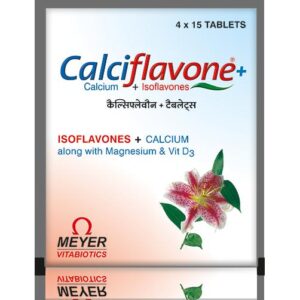VIT D3 + ISOFLAVONES + MILKCALCIUM
Vit D3: Drug Name: Vitamin D3 (Cholecalciferol)
Use:
Vitamin D3 is a dietary supplement used to treat or prevent vitamin D deficiency. It is also used to improve calcium absorption in the body, promote healthy bone and teeth development, and support a healthy immune system.
Mechanism of Action:
Vitamin D3 is converted into its active form, calcitriol, in the body. Calcitriol regulates calcium and phosphorus levels, which are essential for healthy bone development and maintenance. It helps increase the absorption of calcium from the intestines and promotes its reabsorption in the kidneys. Additionally, calcitriol plays a role in controlling cell growth and modulating the immune system.
Dose:
The recommended dose of vitamin D3 varies depending on age, the indication, and the individual’s vitamin D levels. The typical daily dosage ranges from 400 to 2000 International Units (IU) per day for adults and children. However, specific dosing should be determined by a healthcare professional based on individual needs.
Side Effects:
When taken as directed, vitamin D3 is generally safe and well-tolerated. However, consuming excessive amounts can lead to vitamin D toxicity, known as hypervitaminosis D. Symptoms of vitamin D toxicity may include nausea, vomiting, constipation, weakness, frequent urination, and increased thirst. Prolonged or high-dose use of vitamin D3 can cause hypercalcemia (elevated blood calcium levels), which can lead to kidney stones, bone pain, and damage to the heart and blood vessels.
It is important to follow the recommended dosage guidelines and consult a healthcare professional if any side effects occur. Additionally, individuals with certain medical conditions, such as hypercalcemia, kidney disease, or sarcoidosis, should use caution and discuss the use of vitamin D3 with their healthcare provider.
Isoflavones: Isoflavones are a group of naturally occurring plant compounds, primarily found in soybeans and soy-based products. They are classified as phytoestrogens, which means they have a similar chemical structure to the hormone estrogen. Isoflavones are commonly used as dietary supplements to manage menopausal symptoms, improve bone health, and support heart health.
The primary mechanism of action of isoflavones is their ability to bind to estrogen receptors in the body. By doing so, they can exert weak estrogenic or anti-estrogenic effects, depending on the specific circumstances and hormonal balance. This can help alleviate symptoms such as hot flashes, night sweats, and vaginal dryness in menopausal women.
The recommended dose of isoflavones varies depending on the specific product and formulation. Generally, a typical daily dose ranges from 40 to 100 mg. It is important to follow the instructions provided by the manufacturer or consult a healthcare professional for appropriate dosage recommendations.
While isoflavones are generally safe for most individuals, they may cause certain side effects in some cases. These side effects can include gastrointestinal disturbances such as nausea, bloating, and diarrhea. Additionally, isoflavones may interact with certain medications, and individuals with a history of estrogen-sensitive cancers or hormone-related conditions should exercise caution when using them.
It is essential to note that the evidence regarding the efficacy and safety of isoflavones is mixed, and more research is needed to establish conclusive findings. Therefore, it is advisable to consult a healthcare professional before starting any new supplement or medication, especially if you have any pre-existing medical conditions or are taking other medications.
Milkcalcium: Drug Name: Milkcalcium
Use: Milkcalcium is a dietary supplement used to provide additional calcium to the body. It is commonly used to prevent or treat calcium deficiency in individuals who have an inadequate intake of dietary calcium, or in conditions such as osteoporosis, osteopenia, or hypocalcemia.
Mechanism of Action: Milkcalcium works by supplying the body with additional calcium, which is an essential mineral involved in various physiological processes. Calcium is essential for maintaining healthy bones, teeth, and proper muscle function. It also plays a vital role in nerve transmission and blood clotting. Milkcalcium increases calcium levels in the body, helping to meet the daily requirement and restore calcium balance.
Dose: The recommended dosage of Milkcalcium varies depending on age, gender, and specific medical conditions. It is important to follow the instructions provided by the manufacturer or healthcare provider. Typically, the typical adult dose is 1-2 tablets (calcium carbonate 500-1000 mg) per day, taken with food to enhance absorption. However, individual dosing may differ, so it is advised to consult a healthcare professional for personalized dosage instructions.
Side Effects: Although Milkcalcium is generally safe for most individuals, it may cause certain side effects, including:
1. Constipation: Calcium supplementation can lead to constipation in some individuals. Increasing fluid intake and dietary fiber can help manage this side effect.
2. Upset stomach or bloating: Taking Milkcalcium on an empty stomach or in high doses can cause gastrointestinal discomfort, such as stomach upset or bloating. Taking the supplement with food can minimize these effects.
3. Kidney stones: Excessive calcium intake, particularly in individuals with a history of kidney stones, may increase the risk of developing new kidney stones. It is crucial for individuals with this predisposition to consult with a healthcare provider regarding the appropriate dosage and monitoring.
4. Interference with certain medications: Milkcalcium may interact with certain medications, such as some antibiotics, bisphosphonates, and thyroid medications. It is essential to inform your healthcare provider of any medications you are taking to avoid potential interactions.
5. Hypercalcemia: Taking Milkcalcium in excessive amounts can lead to high levels of calcium in the blood, causing symptoms like nausea, vomiting, confusion, and increased thirst. It is important to adhere to the recommended dosage to prevent this condition.
It is always advisable to consult a healthcare professional or pharmacist before starting any new medication or supplement, including Milkcalcium, to ensure it is appropriate for you and to minimize the risk of potential side effects or interactions.

